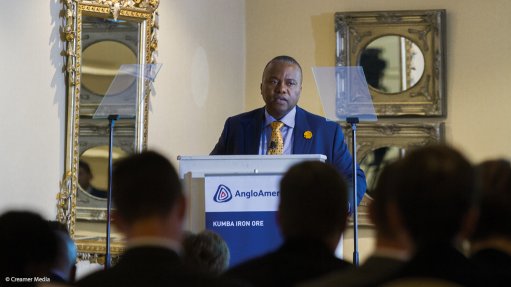
Kumba Iron Ore CEO Themba Mkhwanazi
Photo by: Duane Daws
JOHANNESBURG (miningweekly.com) – Kumba Iron Ore CEO Themba Mkhwanazi on Tuesday expressed concern about the mineral rights and mining transaction moratorium that has been gazetted by Mineral Resources Minister Mosebenzi Zwane, especially because it followed his agreement to suspend the implementation of Mining Charter Three until September.
“We’re concerned about the development, more so particularly it having come when there had been an agreement between the Ministry and the chamber,” Mkhwanazi said at the presentation attended by Creamer Media’s Mining Weekly Online. (Also watch attached Creamer Media video).
Mkhwanazi was responding to a mining analyst during question time following Kumba’s presentation of a spectacular set of results that saw headline earnings leap 53%, operating free cash flow jump 48% to R8.3-billion and the company resume dividend payments, with an interim dividend of R5.1-billion declared representing R15.97 a share.
In his July 19 gazetting, the Minister invited submissions on his intention to suspend the processing of new Section 11, mining and prospecting rights applications or their renewal – a move which Herbert Smith Freehills’ Africa partner and co-chair Peter Leon said inferred an intention to circumvent the underlying purpose of the agreement with the chamber, which on Tuesday served an urgent application with the Pretoria High Court to set aside the notice.
“We’re still very confident that through the chamber and the consultations and discussions, we will arrive at a charter that supports growth, promotes investment and generates jobs,” said Mkhwanazi, adding that at this stage the gazetting had negligible direct impact on Kumba itself.
The head of the Johannesburg Stock Exchange-listed iron-ore subsidiary of Anglo American said that, as a business, Kumba remained fully committed to meaningful and sustainable transformation of the mining industry.
“Our track record on all transformational aspects speaks for itself,” he said, adding that Sishen Iron Ore Company had a 29% black economic empowerment (BEE) shareholding in Kumba.
Since 2006, a total of R28-billion had been distributed to the company’s BEE partners, with Exxaro receiving around R20-billion.
In addition, in the past five years, Kumba had spent R980-million on community development.
BEE suppliers had received R57.4-billion worth of business from Kumba in the past five years and 3 401 houses had been built costing more than R2.7-billion.
Kumba currently had 73% historically disadvantaged South Africans (HDSA) on the board of directors.
The company had 57% HDSA representation at executive management level, 50% in senior management, 62% in middle management and 67% in junior management.
“Combined, this represents 64% across all management levels,” Mkhwanazi told investors, analysts and media representatives.
Twenty one per cent of Kumba’s employees are women, 5% of the annual payroll is spent on skills development and the company was committed to creating an employee share ownership plan (Esop) to reward employees for their hard work and commitment.
“We’re working on the new Esop, which will be finalised once there is more regulatory guidance,” he disclosed.
Meanwhile, on Mining Charter Three and the Minister's subsequent gazetting of the moratorium, the chamber said it would seek the urgent setting aside of the Minister’s gazette notice on one of two bases, namely either the Promotion of Administrative Justice Act or the constitutional principle of legality.
The chamber’s legal advice is that the notice constitutes an unlawful action for a number of reasons including:
- the damaging impact of the notice itself and its proposed further action on the mining sector; and
- that the Minister acted ‘ultra vires’ or beyond his powers under the Mineral and Petroleum Resources Development Act, and unconstitutionally, by issuing the notice.
The chamber notes, with regret, that the industry had no option but to proceed with court action to ensure that the Minister acted within the law, and in the best interests of the industry and the country.